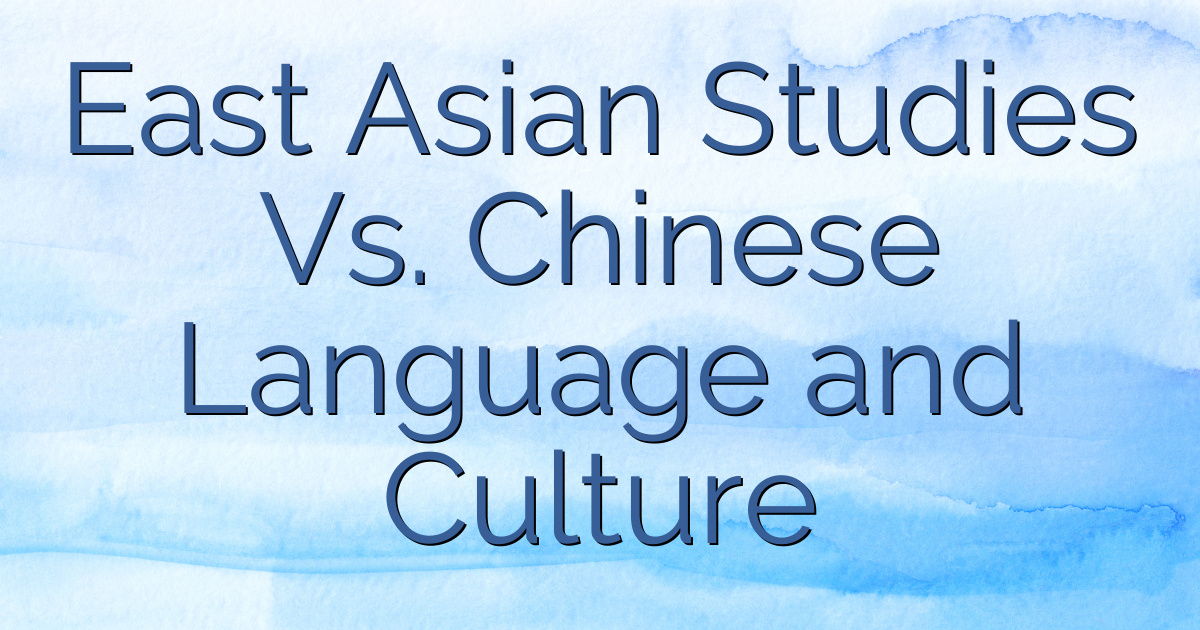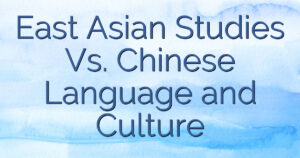
Are you torn between pursuing a major in East Asian Studies or Chinese Language and Culture?
Delve into the depths of these two intriguing fields as we compare their curriculum, language proficiency skills developed, career opportunities, and more.
By examining the nuances of each major, you can gain a comprehensive understanding of the similarities and differences between them.
Whether you aspire to work in marketing or wish to immerse yourself in cultural studies, this article will help you navigate the path towards your academic and professional goals.
Table of Contents
Key Takeaways – East Asian Studies Vs. Chinese Language and Culture
- East Asian Studies offers courses on Chinese, Japanese, and Korean cultures, while Chinese Language and Culture focuses specifically on Chinese language acquisition and cultural studies.
- East Asian Studies provides a broad understanding of the region, including Asian history and culture, while Chinese Language and Culture offers more intensive language learning opportunities.
- Both majors offer study abroad opportunities for language and cultural exchange, enhancing language fluency and cultural understanding.
- East Asian Studies provides a foundation in cultural understanding and language proficiency, making graduates highly sought after in marketing positions with East Asian market presence.
Overview of the two majors: East Asian Studies and Chinese Language and Culture
Let’s take a closer look at the differences between the two majors: East Asian Studies and Chinese Language and Culture.
When it comes to curriculum flexibility, East Asian Studies offers a broader range of courses, covering not only Chinese language and culture, but also other East Asian countries like Japan and Korea.
On the other hand, Chinese Language and Culture focuses specifically on Chinese language proficiency and a deep understanding of Chinese culture. This major allows for more in-depth study of Chinese literature, history, and society.
Both majors provide opportunities for cultural immersion, such as study abroad programs and internships. However, Chinese Language and Culture may offer more intensive language learning opportunities, allowing students to fully immerse themselves in the language and culture through language partner programs and language-intensive courses.
Overview of the curriculum and requirements of the two majors
You should take a look at the curriculum and requirements for both majors in order to make an informed decision. When comparing the coursework flexibility of the East Asian Studies and Chinese Language and Culture majors, it’s important to note that both programs offer a wide range of courses that cover various aspects of East Asian culture, history, language, and society. However, the Chinese Language and Culture major places a greater emphasis on language proficiency, requiring students to take advanced language courses in addition to cultural and historical courses. On the other hand, the East Asian Studies major offers more flexibility in terms of course selection, allowing students to explore a broader range of topics within the region. Both majors also provide opportunities for study abroad programs, which can enhance language proficiency and cultural understanding.
| East Asian Studies | Chinese Language and Culture | |
|---|---|---|
| Language Requirements | Some level of proficiency in an East Asian language is encouraged but not mandatory | High level of proficiency in Chinese language is required |
| Required Courses | – Introduction to East Asian Studies – Asian History – East Asian Culture | – Intermediate and Advanced Chinese Language – Chinese Literature and Culture |
| Elective Courses | – East Asian Politics – East Asian Religions – East Asian Film | – Chinese Calligraphy – Chinese Cinema – Chinese Society |
| Study Abroad Opportunities | Exchange programs with universities in East Asia, summer language programs, and internships are available | Exchange programs with universities in China, language immersion programs, and cultural exchange opportunities |
Overview of coursework, assessments, and study abroad opportunities
The curriculum for both majors includes a mix of required and elective courses, allowing students to explore various aspects of the region and gain a well-rounded understanding. In terms of coursework diversity, both majors offer a range of classes that cover topics such as history, literature, politics, and art. This ensures that students develop a comprehensive knowledge of East Asia or Chinese language and culture, depending on their chosen major.
To enhance their learning experience, students in both majors are encouraged to participate in study abroad programs. These programs provide invaluable opportunities to immerse themselves in the language and culture they are studying. By living and studying in East Asia or China, students gain firsthand experience and develop a deeper understanding of the region.
Comparison of Language Proficiency Skills Developed
Both majors offer opportunities for you to develop strong language proficiency skills through coursework and study abroad experiences.
In the East Asian Studies major, you will study not only Chinese language, but also the history, culture, politics, and economics of East Asia as a whole. This interdisciplinary approach allows you to gain a broad understanding of the region, while also deepening your language fluency.
On the other hand, the Chinese Language and Culture major focuses specifically on Chinese language acquisition and cultural studies. With this major, you will have the chance to immerse yourself in the language through intensive coursework and practice.
Both majors also provide study abroad opportunities, where you can further enhance your language skills by living and studying in a Chinese-speaking country. These experiences are invaluable in developing your language fluency and cultural understanding.
Comparison of Career Opportunities and Job Roles: Marketing
The East Asian Studies major offers career opportunities in marketing that can be pursued through internships and networking. As an East Asian Studies major, you will develop a strong foundation in cultural understanding and language proficiency, which can be valuable in the marketing field.
Here are three ways in which your East Asian Studies major can lead to career advancement and industry connections in marketing:
- Internships: Many companies value employees with a deep understanding of East Asian culture and language. By completing internships in marketing departments of companies with East Asian market presence, you can gain hands-on experience and build a network of industry professionals.
- Networking: Through your coursework and interactions with professors and fellow students, you can establish connections with individuals who are already working in the marketing industry. These connections can provide valuable insights, job opportunities, and mentorship as you navigate your career in marketing.
- Market Research: With your knowledge of East Asian culture and language, you can specialize in conducting market research for companies targeting the East Asian market. This expertise will make you an asset to companies looking to expand their reach in East Asia.
Comparison of Salary Potential: Job Market Demand
Marketing majors with a specialization in East Asian studies have the potential to earn competitive salaries due to the high demand for professionals with expertise in this field. In today’s job market, there is a growing trend towards globalization and companies are increasingly looking to expand their operations in East Asia.
This has created a need for individuals who not only have marketing skills but also possess a deep understanding of the culture, language, and business practices of East Asian countries. As a result, companies are willing to pay a premium for marketing professionals who can effectively navigate and tap into the East Asian market.
Salary expectations can vary depending on factors such as experience, location, and industry. However, marketing majors with a specialization in East Asian studies can expect to earn salaries that are at or above the average for marketing professionals, making it a lucrative career choice.
Similarities between East Asian Studies and Chinese Language and Culture: Language Acquisition
Learning Mandarin is essential for students specializing in East Asian studies. It helps you develop a deeper understanding of the region’s language and culture. Language immersion plays a crucial role in this process. It allows you to fully immerse yourself in the language and gain practical skills in speaking, reading, and writing Mandarin.
By studying Mandarin, you can engage in cultural immersion as well. Language and culture are deeply intertwined. This immersion provides you with the opportunity to explore the nuances of Chinese traditions, customs, and societal norms. It also enables you to better appreciate and analyze various aspects of East Asian societies, such as literature, history, art, and politics.
Through language and cultural immersion, you can develop a holistic understanding of East Asian studies. You can contribute to cross-cultural understanding and communication.
Difference between the two majors: Cultural Studies
In addition to language acquisition, another significant difference between the East Asian Studies and Chinese Language and Culture majors is the focus on cultural studies. While both majors explore the rich cultural heritage of East Asia, they approach it from different angles.
As an East Asian Studies major, you will have the opportunity to immerse yourself in the diverse cultures of East Asian countries such as China, Japan, and Korea. This cultural immersion allows you to gain a deeper understanding of the traditions, customs, and values of these societies. Additionally, you will have the chance to engage in research opportunities that explore various aspects of East Asian culture, such as literature, art, history, and religion.
On the other hand, the Chinese Language and Culture major places a specific emphasis on Chinese culture and society. With a strong focus on language proficiency, you will be well-equipped to delve into the intricacies of Chinese literature, history, philosophy, and contemporary issues. Through research opportunities, you can explore topics such as Chinese art, film, and popular culture, providing a comprehensive understanding of Chinese society and its global impact.
To further illustrate the differences, here is a table highlighting the key aspects of cultural studies in both majors:
| East Asian Studies Major | Chinese Language and Culture Major |
|---|---|
| Explores multiple East Asian cultures | Focuses primarily on Chinese culture |
| Provides a broad perspective on East Asian history, literature, art, and religion | Focuses on Chinese history, literature, art, and philosophy |
| Offers research opportunities in various aspects of East Asian culture | Offers research opportunities in Chinese art, film, and popular culture |
Factors to consider when choosing between the two majors: Language proficiency
One important factor to consider when choosing between the East Asian Studies and Chinese Language and Culture majors is the level of language proficiency required.
While both majors cover various aspects of East Asian culture, the Chinese Language and Culture major places a stronger emphasis on language fluency. In this major, you will not only study the cultural, historical, and social aspects of China but also develop a high level of proficiency in the Chinese language.
This can have a significant impact on your career prospects, as fluency in Chinese is increasingly in demand in today’s global job market. With language skills, you can pursue careers in translation, interpretation, international business, diplomacy, and more.
On the other hand, if you have a strong interest in East Asian culture but do not wish to focus solely on language, the East Asian Studies major may be a better fit for you.
Conclusion
In conclusion, choosing between East Asian Studies and Chinese Language and Culture ultimately depends on your individual goals and interests.
Both majors offer valuable skills in language acquisition, cultural understanding, and critical thinking. However, if you are specifically interested in Chinese language and culture, the Chinese Language and Culture major may be a better fit for you.
On the other hand, if you have a broader interest in East Asian countries and their cultures, East Asian Studies provides a more comprehensive approach.
Consider your language proficiency, career aspirations, and personal interests when making this decision.
What path will you choose to embark on your journey of East Asian exploration?

